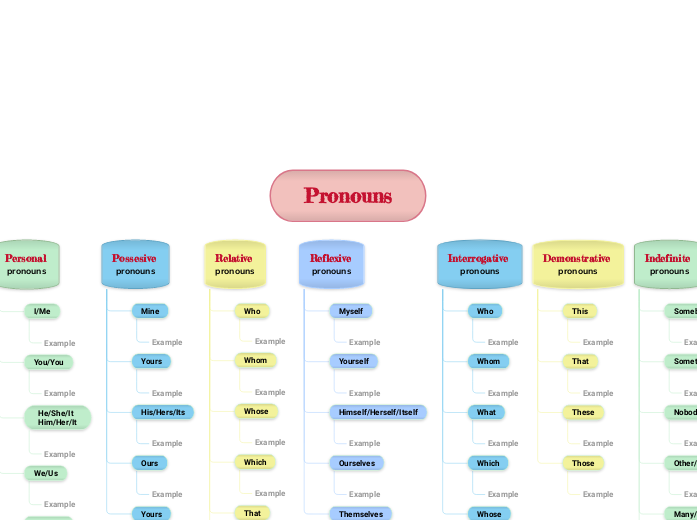English Pronouns
Use this mind map to understand how pronouns are used in different situations and practice by creating contexts.
Keywords: grammar, language


Meer zoals dit
Use this template to learn the pronouns in English. Pronouns are the parts of speech used instead of nouns to avoid repetition. Depending on the situations in which they are used, they have different forms.
The types of pronouns are:
Personal pronouns
Possessive pronouns
Relative pronouns
Reflexive pronouns
Demonstrative pronouns
Interrogative pronouns
Indefinite pronouns
Personal pronouns are the pronouns that refer to specific people or things. They can change depending on the person, number, gender, or case.
Examples of personal pronouns, singular and plural form:
I/Me
You/You
He/She/It Him/Her/It
We/Us
You/You
They/Them
Possessive pronouns show that something belongs to someone.
Examples of possessive pronouns:
Mine
Yours
His/Hers/Its
Ours
Yours
Relative pronouns describe nouns in terms of how they relate to other words.
Examples of relative pronouns:
Who
Whom
Whose
Which
That
What
Reflexive pronouns are used when the subject of a sentence is also the object of the sentence.
Examples of reflexive pronouns:
Myself
Yourself
Himself/Herself/Itself
Ourselves
Themselves
Demonstrative pronouns point to and identify a noun or a pronoun. They are used in place of particular things to show which one we’re discussing.
Examples of demonstrative pronouns:
Somebody/Someone
Something/Anything
Nobody/Nothing
All
Other/Another
Both/Each
Many/Most
Some/Few
None
Such
Interrogative pronouns are the pronouns used in questions. In sentences, when the pronoun is a subject, the verb will precede the pronoun.
Examples of interrogative pronouns:
Who
Whom
What
Which
Whose
’Who’ and ‘whom’ are used to refer to people and which is used for animals and things.
Indefinite pronouns refer to a thing or person that is identifiable, but not specified.
Examples of indefinite pronouns:
This
That
These
Those
Complete the template by adding examples of phrases with these pronouns. In this way, you will retain information easier.
Pronouns - a word that can function as a noun phrase used by itself and that refers either to the participants in the discourse.
An indefinite pronoun is a pronoun that refers to a person or a thing without being specific.
Demonstrative pronouns are pronouns that point to specific objects. They function as subjects or objects.
An interrogative word or question word is a function word used to ask a question,
Reflexive pronouns are words ending in -self or -selves that are used when the subject and the object of a sentence are the same. They refer back to an earlier noun or pronoun.
A relative pronoun is a pronoun that marks a relative clause. They link one part of a sentence to another.
Possessive pronouns show that something belongs to someone. Replaces noun in phrases.
Personal pronouns are pronouns that are associated primarily with a particular grammatical person – They represents people places or things.
Write phrases as examples.
Mindmappen helpen je brainstormen, relaties leggen tussen concepten, organiseren en ideeën genereren.
Lege mindmapsjablonen bieden echter een eenvoudigere manier om aan de slag te gaan, omdat het kaders zijn die informatie bevatten over een specifiek onderwerp met begeleidende instructies. In essentie zorgen mindmapsjablonen voor de structuur die alle elementen van een specifiek onderwerp combineert en als startpunt dient voor je persoonlijke mindmap. Ze zijn een hulpmiddel om een praktische oplossing te bieden voor het maken van een mindmap over een bepaald onderwerp, zowel voor het bedrijfsleven als voor het onderwijs.
Mindomo brengt je slimme mindmap templates waarmee je moeiteloos kunt functioneren en denken.
Beschrijvende onderwerpen
Onderwerpen met achtergrondtekst
Standaard tak
De sjabloongegevens verwijderen
Je kunt kiezen uit verschillende mind map templates van Mindomo's zakelijke of educatieve accounts, of je kunt je eigen mind map templates maken. Elke mindmap kan getransformeerd worden in een mindmap template map door extra notities toe te voegen aan één van de onderwerpen.